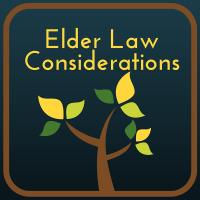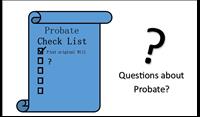|
|
The Dean Law Firm Blog
Wednesday, April 27, 2016
A daughter taking over the care of her mother recently diagnosed with dementia goes to the bank to handle her bills, only to be turned away because she has no authority to handle her mother’s account. Imagine her frustration… Because her mother did not plan beforehand for her disability, the daughter’s only option now is a guardianship proceeding through the court.
One of the common documents that is part of an Estate Plan is the “Durable Power of Attorney.” What makes this document so powerful? Essentially, the designation of a Power of Attorney allows you to give financial decision-making power to someone you trust. You get the option of making it effective immediately, which may be beneficial for spouses, or to make it effective in the event of your disability. Read more . . .
Thursday, April 7, 2016
 When planning your estate, you must consider how you hold title to your real and personal property. The title and your designated beneficiaries will control how your real estate, bank accounts, retirement accounts, vehicles and investments are distributed upon your death, regardless of whether there is a will or trust in place and potentially with a result that you never intended. One of the most important steps in establishing your estate plan is transferring title to your assets. If you have created a living trust, it will not function as intended if you fail to transfer the title on your accounts, real estate or other property into the trust. Unless the assets are formally transferred into your living trust, they will be subject to probate.
Read more . . .
Friday, March 4, 2016
 The high cost of long-term care has made planning a critically important issue for most middle class seniors and their families. In fact, most seniors will likely require some form of long-term care. Sadly, many of them are unprepared for the significant financial burdens it places on their family’s hard earned savings. While some seniors are able to afford private pay care, the cost of long-term care will wipe out savings of all but the wealthiest families in a matter of years. Those who have planned ahead by purchasing long-term care insurance have a degree of certainty and peace of mind, knowing that they have a lesser need to rely on other sources in the future. Unfortunately, many can’t afford the high cost of long term care insurance or worse, because of age or medical condition cannot qualify for long term care insurance altogether. If you do have long-term care insurance, you should be aware of what your policy covers. Many policies have high deductibles or provide for only a short period of care in facility. In fact, many who have long-term care insurance still have to resort to Medicaid to pay for their care. The other option to pay for care is Medicaid. A joint federal-state program, Medicaid provides medical assistance to low-income individuals, including those who are 65 or older, disabled or blind. Medicaid is the single largest payer of nursing home bills in America and serves as the option of last resort for people who have no other way to finance their long-term care. While Medicaid eligibility with respect to long-term care was not difficult in the past, there has been a steady drift towards more complex and restrictive rules. It’s no longer as easy as reviewing one’s bank statements. There are a myriad of regulations involving look-back periods, income caps, transfer penalties and waiting periods to plan around. Unfortunately, the advice given by well-meaning friends is often faulty, placing you or your loved one in a worse situation. Pre-planning can help avoid the financial ruin associated with the high cost of long-term care.
Tuesday, January 5, 2016
 Happy New Year! The chilly January breeze blows in with a sense of new beginnings, fresh starts, and goal setting. What better time than now to create a “New Year’s Resolution”, a tradition passed down for generations? As you think about what resolutions you wish to establish, consider making 2016 the year you institute your Estate Plan. While nobody wants to think about death or disability, establishing an estate plan is one of the most important steps you can take to protect yourself and your loved ones. Proper estate planning puts you in charge of decisions concerning your legacy, your finances and medical matters. It can also spare your loved ones the expense, delay and frustration associated with managing your affairs when you pass away or become disabled. Taking the steps to get Estate Planning documents prepared is a gift, not only to you, but to those you love. Regardless of the size of your estate, proper planning brings peace of mind. By taking action now, you can ensure your legacy is as you want it and your family’s needs are provided for when they need it most. As you start this New Year reflecting, dreaming, and considering your priorities, resolve to take this important step.
Wednesday, December 2, 2015
 Have you ever found yourself frantically searching for an important document, assuming it was in one place but realizing you have no idea where you stored it (or where it seemingly “walked off” to)? This is common, especially when we have full schedules and an abundance of paperwork. The good news is that there are ways to help organize your important paperwork and eliminate stress and frustration that comes with being unable to locate paperwork when it is needed. Here are 5 tips to help you on the journey to organization:
- Have one centralized location for important documents.
This could be a home office or a lockable file cabinet in your closet. Think of a place that is best suited for your needs. For legal documents, you may want to store originals in a safety deposit box at a bank or secure location in your home, while keeping copies in a more accessible area. Other hard to replace documents, such as passports and marriage certificates, can be kept in a fireproof box for safe keeping.
- Utilize organization tools.
File boxes, colorful folders and tabs, and digital storage options (such as USB drives, CDs, or back-up hard-drives) are excellent tools to assist you.
- Find a filing system that is most natural to you.
Alphabetical? Grouped by category (medical, financial, estate plan documents, tax paperwork, etc.)? What is your natural way of thinking?
- Create a consistent routine for filing.
Consider: (1) Having a “catch-all” folder/bag/box to put bills, statements, and other miscellaneous items that come in throughout the month. Find one day a month to organize and file those items. (2) For legal and other critical documents, it is best to store them properly as soon as possible. (3) You may want to give your successor Trustee or Executor copies of your documents as well.
- Eliminate unneeded paperwork.
Once a year, find a time to go through your files and shred or throw away any unnecessary paperwork. This may be old receipts, old tax papers (it is recommended by the IRS that you keep tax paperwork for 7 years to ensure you no longer will need them), or unneeded paper/envelopes that come with statements and bills.
Taking the time to establish a system can truly save you time and unnecessary stress in the long-run. The key is to find what works best for you and your personality.
Wednesday, November 11, 2015
 Family dynamics are a complex matter. Each family has its own set of values and experiences. It is not uncommon that parent’s and grandparent’s intentions when leaving an inheritance can be misunderstood by their children and grandchildren. This is particularly true in cases where the inheritance left appears unequal or if there is a blended family situation. In any family, there are many benefits to taking time to explain your values and also your intentions in your Estate Plan. There are many ways to accomplish this, three of which are discussed in this article. One avenue of explaining beneficiaries’ inheritance is to include specific writing in your Will or Trust document. A section dedicated to the intent behind the document helps to create common understanding between you, the Grantor, and your beneficiaries. Another option which is more personal is to write a letter to all or each of the beneficiaries. That can go a long way to ease tensions or disagreements. Writing a personal letter can be particularly meaningful to children and grandchildren. Consider utilizing this letter to encourage positive character traits and values you see in your loved one as you also describe your intent in their inheritance. While the Estate Planning documents or letters accompanying the documents are beneficial, one of the most effective ways to avoid family division or tension is to have family meetings and communicate clearly during your lifetime. The more intentional and open your communication, the more clearly your actions and decisions will be understood. The setting and structure of family meetings will look quite different based on each family’s make-up. Whether meeting altogether or one-on-one, the main goal is to communicate openly. Family division due to inheritance is avoidable. Be encouraged that even small steps to communicate and express your thoughts creates depth of understanding between the generations. Focus on the relationships and the values you hope to inspire in those you love.
Friday, October 16, 2015
 Talking with aging parents about estate planning and finances may be one of the most difficult conversations to approach. Finances are an extremely personal topic, and each family relates differently with money.
- Approach the conversation with sensitivity and understanding.
Because this is somewhat of a role reversal, approaching the conversation with sensitivity and understanding is essential. Acknowledging that this is difficult for them brings a sense of compassion and understanding. Also, meeting at a time that is not pressured and a location that is low-stress can help ease the tension of the discussion.
- Consider how to bring up the subject.
Prepare for the talk. One way to approach it is to work on your own estate plan, and then explain to your parents that you are in the process of establishing your estate plan and ask them if they have theirs in place. Another idea is to approach the subject by sharing a story of a friend who has experienced the effects of not having these things in order. Expressing your concern and why you hope to communicate about the subject may help them be more willing to talk. Most importantly, emphasize you want to help ease any stress they feel about their future.
- Gather important documents.
Work on gathering important financial, medical, and estate planning documents. Knowing where they are kept and how to access them helps to avoid complications later. Consider consolidating multiple bank accounts and simplifying financial tasks, such as setting up automatic bill pay or deposits.
- Ensure their Estate Plan is in place.
If documents are not already in place, explain the importance of deciding how they would like their assets distributed, as well as who they would like to help them handle their finances and medical decisions. Powers of attorney can become vital if a parent becomes unable to make their own decisions. Having them in place before that time comes avoids the stress and extra expense of a court-order guardianship in an already difficult time.
- Communicate – something is better than nothing.
Communication is key. While it may be a process, start the conversation sooner rather than later. The difficulty only increases should a crisis arise. Rather than focusing on money, focus on determining what they value and finding ways to help them feel supported.
Wednesday, September 23, 2015
 We are used to getting regular check-ups for medical and dental health, and even our finances. While it may not need to be as frequent, the same holds true for your Estate Plan. There are multiple factors that determine a need for change in your Estate Planning documents. We have compiled a list of life events that could call for an Estate Plan check-up. -
Birth or adoption of a new child or grandchild
- Children or grandchildren reach adulthood
- Death, Disability, or Illness that impacts those named in your documents
- Change in desired guardians for minor children
- Marriage
- Divorce
- Receiving a large inheritance or gift
- Changes in tax laws
- Changes of your desired executors or agents
- Start or close of a business
- Gain or loss of a significant asset
- Move to a new state
It is a good idea to review your estate plan every three to five years to ensure that it is all still according to your desires.
Friday, August 7, 2015
 Some people believe that if they have a Will, then no probate is necessary. Quite the opposite is true. Generally, only a properly funded living trust can avoid probate. If there is a Will, the Deceased’s estate will go through a court-managed process called probate. What is probate? Probate is basically a process where the Will is examined by the court to determine if it is valid under Texas law, to prove up the facts of death, and to appoint an Executor who will manage and distribute the assets under the terms of the Will.
There are many different types of probate. This article discusses the usual form of probate proceeding where there is a Will and no one contests it. But there are other types of probate proceedings to streamline transfer of title to property and also for those individuals who pass away without a Will.
For the standard probate proceeding with a Will, the process involves the following steps:
- Application is filed with proper court requesting admission of Will into probate and requesting appointment of Executor for estate administration.
- Public notice is sent that Applicant (usually Executor named in Will) is seeking to probate Will.
- Short hearing is held in front of judge with Applicant testifying as to facts of death, that Will submitted has not been revoked, and that Applicant is qualified to be Executor.
- After the hearing, Applicant is sworn in as Executor and will receive Letters Testamentary. Letters Testamentary are proof to others the Executor is acting with the authority of the court to handle the estate. With Letters Testamentary, the Executor can sell assets, transfer title to assets, and sign tax returns and other legal documents on behalf of the estate.
- Notice Will admitted to probate and of appointment of Executor is sent to all beneficiaries, enclosing copy of the Will.
- Inventory and appraisal of estate assets is prepared, with copies supplied to all beneficiaries and an affidavit of compliance filed with the court.
- Payment of estate debts to rightful creditors.
- Executor sells assets or retitles assets into names of beneficiaries.
-
Income Tax Return and Estate Tax Return prepared and taxes paid, if applicable.
- Final distribution of assets to beneficiaries.
Wednesday, June 17, 2015
 Do you enjoy giving to charity, but worry that if you give to charity in your Will or Trust, that doing so may cause you not to provide for your family in the way you would like? The beauty of Estate Planning is that it allows you to choose from a variety of options to tailor your plan to your wishes and particular situation. By planning ahead, you can take advantage of the benefits of incorporating charitable giving into your estate plan while also ensuring a legacy for your family. For example, estate planning that contains charitable giving may help you save on income and estate taxes, provide a meaningful contribution to the charity of your choice, and even guarantee a steady stream of income to your family.
One of the most common tools is the Charitable Remainder Trust (CRT). The CRT provides the beneficiary the ability to receive income for his or her lifetime, or for a set period of years. At death, or the conclusion of the set period, the “remainder interest” held in the trust is transferred to the charity you have chosen. You receive a tax deduction based on the calculated remainder interest that will be left to charity. This remainder interest is calculated according to the terms of the trust and the Applicable Federal Rate published monthly by the IRS.
The Charitable Lead Trust (CLT) follows the same basic principle, in reverse. With a CLT, the charity receives the income for a set period of years, with the remainder interest transferring to your heirs upon his or her death.
With several ways to incorporate charitable giving into your estate plan, it is important that you carefully consider the benefits and consequences, taking into account your assets, income and desired tax benefits.
Friday, May 15, 2015
 Have you ever considered how you might grow your estate so that it can be a gift to not only your children, but also your grandchildren and beyond? Do you anticipate one or all of your children spending their inheritance without much thought? The vast majority of non-spouse heirs to retirement accounts blow a great opportunity to increase wealth by receiving outright distribution of all their inherited retirement accounts shortly after receiving them. With proper planning, your retirement accounts can be one of the greatest legacies you can leave to your heirs. A Retirement Inheritance Trust is an effective tool to ensure your retirement assets are not squandered that also gives your heirs the gift of continued tax-free growth based upon their own life expectancy, while allowing you to design how those assets are distributed. The ability to maximize income tax deferral and accumulate wealth is one of the greatest advantages of a Retirement Inheritance Trust. Proper planning can allow your heirs to take advantage of the “stretch-out”, allowing your assets to continue to grow tax-free over time rather than being distributed outright and having to pay income taxes right away.
Another major benefit of Retirement Inheritance Trusts is that they provide protection in many scenarios. These important protections include asset protection from creditors, lawsuits and bankruptcy, and divorce protection. Further, properly drafted retirement trusts can ensure protection for minors, as well as the elderly or disabled. If a beneficiary is entitled to government benefits, the trust can be designed to keep them from being disqualified to receive aid.
A Retirement Inheritance Trust is a separate trust that would accompany your Will or Living Trust to specifically address the unique asset of your retirement accounts. Retirement accounts are subject to many particular governmental requirements and the trust must be designed to address them properly to ensure the accumulation of the wealth over time and to increase the impact of your estate’s legacy.
The Dean Law Firm, PLLC assists clients in Sugar Land, TX and throughout Houston in Fort Bend County and Harris County.
|
|
|
|